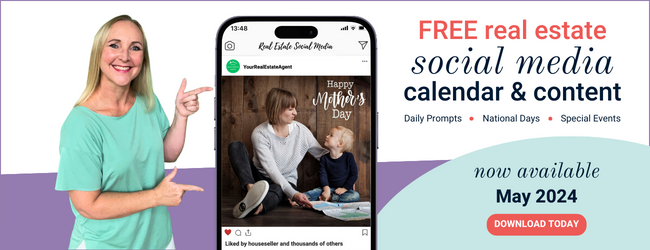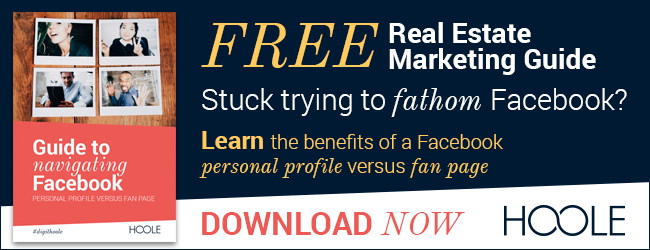When it comes to advertising your vendor’s property on Facebook, do you have better engagement by keeping real estate buyers within your Facebook page or by leading them off the social channel to your real estate website?
The ability to search for property listings on Facebook has been a more significant topic in the USA than, seemingly, for us antipodeans in the Australian and New Zealand real estate markets.
While there are a handful of real-tech companies in our region that will help you create apps to showcase all your property listings within Facebook, the uptake by real estate agencies has been relatively low.
If you read Inman.com or keep an eye on our American cousins, you’ll see that they are ahead in terms of the number of Facebook property listing options they have available to them.
These include;
1. Real estate apps – for creating property listings on your Facebook page.
2. Marketplace – a new area on Facebook where real estate agents and the general public can post classified property listings for sale or rent.
3. Facebook’s partnership with ApartmentList.com and Zumper.com – allowing advertisers to post apartments for rent, with enhanced features such as property price and the number of bedrooms.
4. Facebook dynamic ads (retargeting for real estate) – which promote a home’s price, availability and bedroom count to people who have browsed a property on a real estate website or app.
So, when it comes to knowing whether you should advertise a property inside or outside Facebook, it seems that Facebook are also hedging their bets!
What do real estate social media marketing experts think?
Recently, I caught up with fellow Facebook Marketer Neil Campbell, ListingLogic, to find out why he believes real estate agents are should keep property advertising within Facebook.
Neil also shared his thoughts on Facebook Custom Audiences, and how he believes that building audiences specific to different types of property listings are the future of digital advertising for real estate, too.
“Facebook hands us an amazing amount of information on a plate, through Facebook Audiences,” Neil enthuses. “As advertisers, we just need to learn how best to use this information.”
Neil’s experience extends beyond real estate Facebook marketing. His company also assists consumer goods brands, from wine merchants to diamond jewellers, which has given him some fantastic insights into what consumers will or won’t purchase on Facebook.
The success Neil has seen with online wine auctions, in particular, has shown that campaigns that encourage consumers to make wine purchases on Facebook have a higher ROI than campaigns that require them to leave Facebook and make their transaction on the wine merchants website.

Is Facebook a matchmaking service for businesses?
Neil remembers a time when most people didn’t believe you could sell anything directly to a customer within Facebook itself. But, he was always convinced otherwise. He recognised that, “like most digital advertising platforms, Facebook is essentially a matchmaking service. As long as you know who your ‘ideal customer’ is, you can find them.”
“Facebook advertising is about behavioural targeting,” he explains. “As a consumer, we give away details about what we are interested in through the pages and posts we read and like on a daily basis.”
And it’s this information, in the form of Facebook’s’ Audience Insights tools that smart Facebook marketers know how to use to their client’s advantage.
Building ready-made audiences for your property
For many real estate principals and agents, navigating Facebook’s Audience Insights feels like a minefield. Knowing how to leverage the rich amount of demographic information available that people, actively interested in property, share in order to create worthwhile Facebook ‘custom audiences’ is too complicated for many.
But by engaging a Facebook marketer you or your agency can have professional help building a picture of your ideal consumer using the information and attributes that home buyers and sellers are most likely to provide through the platform.
Information such as biographical details, a person’s interests (shown through liking or following pages and communities), to locations gleaned through the user’s app engagement. And the best part is that once created, these target audiences belong to you, the advertiser, and can be re-advertised too, over and over again.
Another benefit of a custom Facebook audience, unlike many forms of online property advertising, is that your audience continually refreshes and updates due to the behavioural targeting nature of Facebook advertising. Unlike email lists, your Facebook audience can be set to show you a list of people that have been active and interested in property over the last, 30, 60, 90 days.
Having a list that gets refreshed is key to your marketing effectiveness. Once someone has purchased a property their interest in engaging with property related posts is likely to wane, so the great thing is that these people will no longer see your ads. In fact, these customers will be replaced by a host of new buyers and sellers actively looking for a property.

Keeping customers where they’re comfortable
While the advertising merits of Facebook have long been recognised by the social media marketing industry, there was always an assumption that you needed to take the customer out of Facebook, redirecting them to your own website to transact or engage with them.
Neil highlights that this doesn’t have to be the case – there is significant sales potential in keeping consumers within a platform that they already trust, rather than redirecting them to a real estate website they may not have visited before.
“Consumer psychology in Facebook is more relaxed, it’s more engaged,” he asserts. “And at the same time, people, in general, are becoming more comfortable with transacting on Facebook directly.”
Lowering the high costs of Facebook advertising
By focusing on building a property advertising audience within Facebook, forward-thinking real estate agencies can convert a higher number of social media visitors into enquiries, as well as lower their overall marketing costs. Trying to get buyers and sellers out of Facebook on to your own real estate website is typically very costly, due to the high bounce rates.
Don’t bombard your Facebook Fans with irrelevant properties
So, point your Facebook ads to listings or property pages that exist within your real estate Facebook page. Rather than turning your Facebook Page’s timeline into an endless property listing channel (with no property filtering function), share only your showcase properties (i.e. the type of properties you’d like to list and sell more of).
You can then promote the remainder of your property listings using dark posts (news feed style ads that don’t publish to your Facebook page’s timeline). Plus concentrate more on building brand engagement by using your real estate Facebook page to share information-rich, community-focused content with local followers.
Neil says his clients within the Australian and New Zealand real estate sector are spending about 20% of the agents’ total commission structure on digital advertising. With numbers like these, it’s more important than ever to get your audience and social media advertising right.


Join the Conversation - add your thoughts